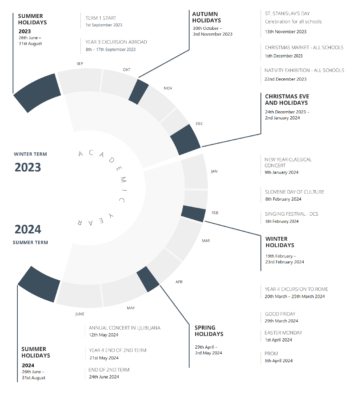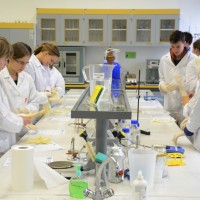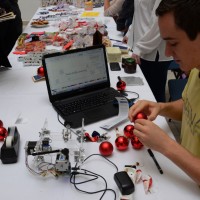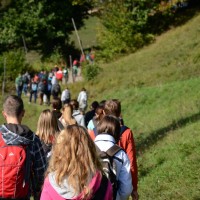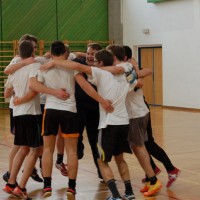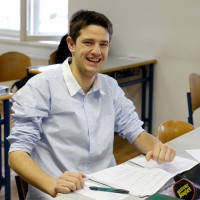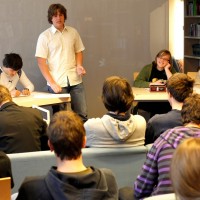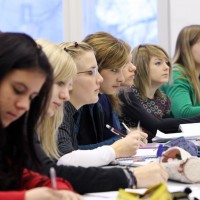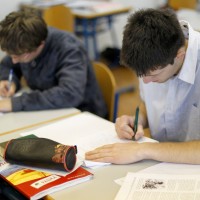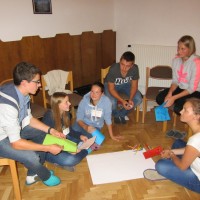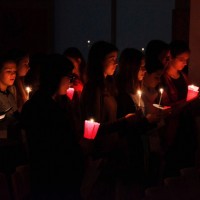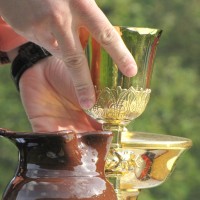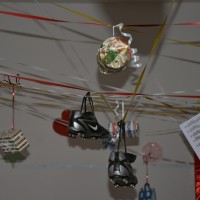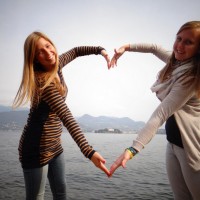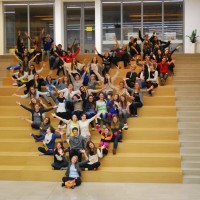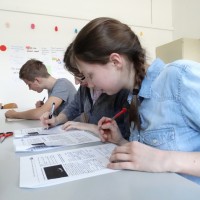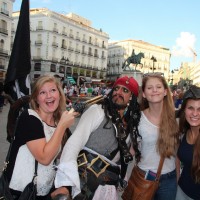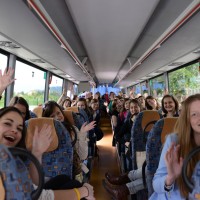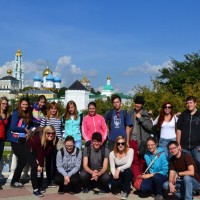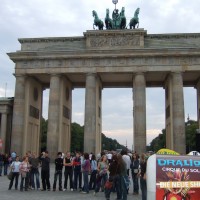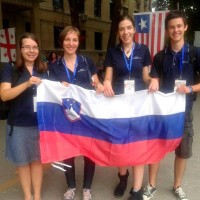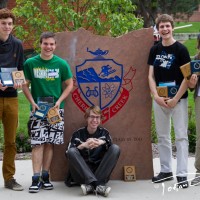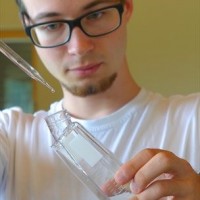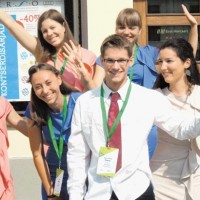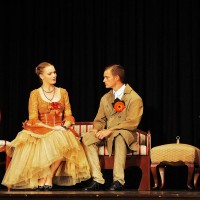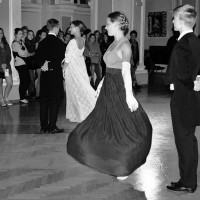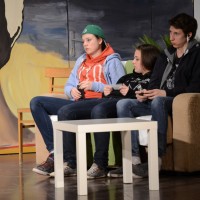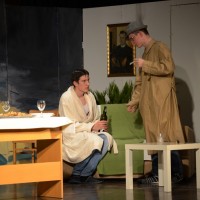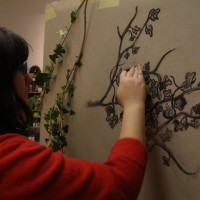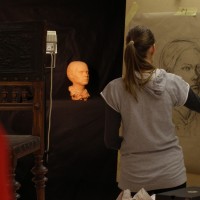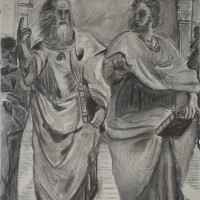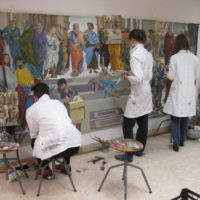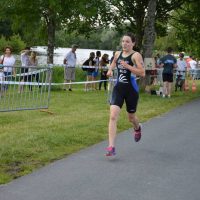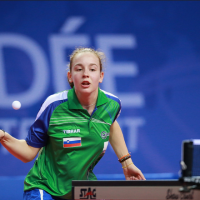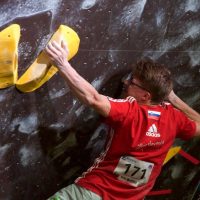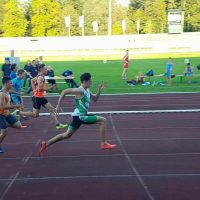The mission of the DCG is to educate the individual in the community on the basis of Christian values and classicism, and to guide the student’s formation into a well-rounded, creative and principled person, prepared for continued growth and responsible participation in society.
The values towards which all students and employees strive are: community, faith, creative knowledge, personal growth and professionalism.
Staff
Headmaster: Rihard Režek, B.A.; [email protected]
Deputy Head: Marjeta Prašnikar, B.Sc.; [email protected] ; Lily Schweiger Kotar, B.A., [email protected]
School Chaplain: Gregor Bregar, B.A.; [email protected]
International Office, Secretary: Tina Tandler. B.A.; [email protected]
Heads of Departments
School Counsellor: Maja Turšič, B.Sc.; [email protected]
Religion and Education, Philosophy, Psychology: Jernej Pisk, Ph.D.; [email protected]
Slovene Language, History of Art: David Puc, Ph.D.; [email protected]
Mathematics and Computer Science: Andreja Jelovčan, B.Sc.; [email protected]
Foreign Languages: Valerija Lah Peternel, B.A.; [email protected]
Classical Languages: Dragica Fabjan Andritsakos, Ph.D.; [email protected]
History and Geography: Hočevar Marjeta, B.A.; [email protected]
Physical Education, Sports: Gorazd Turk, B.Sc.; [email protected]
Music: Marjetka Kozmus, B.A.; [email protected]
Natural Science: Martin Čokl, B.Sc.; [email protected]
School Life
Curriculum
DCG stresses the integral growth of a young person. It is committed to encouraging a joyful existence, compassion and mutual responsibility as well as innovative spirit. In all our efforts, our noble tradition is productively intertwined with creativity which is manifested in a vast array of curricular and extracurricular activities.
The emphasis lies not only in academic excellence, but also in the difference students should make in the world.We aim to achieve this especially through the following curricular activites in which all students take part: pastoral care and volunteer work, classical education, music, sports as well as cooperation with numerous schools in Slovenia and abroad.
Extracurricular activities are to be chosen according to students’ interests, among which choirs, a variety of sports and science clubs, entrepreneurship, drama and impro clubs, and school of fine arts are the most popular.
For detailed numbers of lessons per week from year 1-4 see Curriculum in numbers
Curriculum in numbers
| Without Greek |
1. |
2. |
3. |
4. |
total |
Matura |
total |
| Religious Education |
2 |
2 |
1 |
1 |
210 |
||
| Slovene |
4 |
4 |
4 |
4,75 |
586 |
|
|
| Mathematics |
4 |
4 |
4 |
4,5 |
578 |
|
|
| English |
4 |
3 |
3 |
3,75 |
481 |
|
|
| Latin |
3 |
3 |
3 |
2 |
385 |
+3 |
490 |
| German/French/Spanish/Russian |
3 |
2 |
2 |
2 |
315 |
+4 |
455 |
| History |
2 |
2 |
2 |
2 |
280 |
+3 |
385 |
| Physical Education |
3 |
3 |
3 |
3 |
420 |
||
| History of Art |
– |
1 |
– |
– |
35 |
+4 |
175 |
| Computer Science |
2 |
– |
– |
– |
70 |
+4 |
210 |
| Geography |
2 |
2 |
2 |
– |
210 |
+4 |
350 |
| Biology |
2 |
2 |
2 |
– |
210 |
+4 |
350 |
| Chemistry |
2 |
2 |
2 |
– |
210 |
+4 |
350 |
| Physics |
– |
3 |
3 |
– |
210 |
+4 |
350 |
| Psychology |
– |
– |
2 |
(2)* |
70 |
+4 |
210 |
| Philosophy |
– |
– |
(2)* |
2 |
70 |
+4 |
210 |
| Total |
33 |
33 |
33 |
24 |
|||
| Maturity optional subjects (two) |
– |
– |
– |
7 |
|||
| Music |
1 |
– |
– |
35 |
|||
| Active Citizenship
Compulsory courses to be chosen |
– 90 |
– 90 |
35 55 |
– 30 |
| With Greek |
1. |
2. |
3. |
4. |
total |
Matura |
total |
| Religious Education |
2 |
2 |
1 |
1 |
210 |
||
| Slovene |
4 |
4 |
4 |
4,75 |
586 |
|
|
| Mathematics |
4 |
4 |
4 |
4,5 |
578 |
|
|
| English |
4 |
3 |
3 |
3,75 |
481 |
|
|
| Latin |
3 |
3 |
3 |
2 |
385 |
+3 |
490 |
| Greek |
2 |
2 |
3 |
3 |
350 |
+4 |
490 |
| German/French |
3 |
2 |
2 |
2 |
315 |
+4 |
455 |
| History |
2 |
2 |
2 |
2 |
280 |
+3 |
385 |
| Physical Education |
3 |
2 |
3 |
2 |
420 |
||
| History of Art |
1 |
– |
– |
35 |
+4 |
175 |
175 |
| Computer Science |
2 |
– |
– |
– |
70 |
+4 |
210 |
| Geography |
2 |
2 |
(2)* |
– |
210 |
+4 |
350 |
| Biology |
2 |
2 |
2 |
– |
210 |
+4 |
350 |
| Chemistry |
– |
2 |
(2)* |
– |
210 |
+4 |
350 |
| Physics |
– |
2 |
2 |
– |
140 |
+4 |
280 |
| Psychology |
– |
– |
2 |
(2)* |
70 |
+4 |
210 |
| Philosophy |
– |
– |
(2)* |
2 |
70 |
+4 |
210 |
| Total |
33 |
33 |
33 |
26 |
|||
| Maturity optional subjects (two) |
– |
– |
– |
7 |
|||
| Music |
1 |
– |
– |
– |
35 |
||
| Active citizenship
Compulsory courses to be chosen |
– 90 |
– 90 |
35 55 |
– 30 |
*optional
Important dates in the school year 2023/24
Academic structure
Each grade level is divided into five or six parallel classes. There are up to 32 girls and boys in each class.
The academic year is divided into two terms, starting on 1st September and ending in the last week of June. An exception are the fourth-year students who take the maturity examinations (“A-levels”) and finish lessons at the end of May, when they prepare for the final examinations.
Class periods last 45 minutes. There are five-minute breaks between the lessons, and a main 35-minute break with a snack. Students have seven periods per day, though only six on Wednesdays. School starts at 7.44 and ends at 14.11, and on Wednesdays ends at 13.31.
Each class has its own classroom and all lessons are held there. In addition some lessons are also held in special classrooms for chemistry, biology, physics, and music, as well as in laboratories and the computer room.
All classrooms are supplied with loudspeakers and equipped with LCD projectors and internet access.
There are 70 teaching staff at the DCG. Also on staff are a school counsellor, librarian and school chaplain. Technical personnel provide essential support for the successful functioning of the school and Institution.
Maturity Examination
At the end of the fourth year students take the maturity examinations (“A levels”), which are the same for all graduating gymnasium students in Slovenia. They are examined in five subjects of which three are obligatory (Slovene, mathematics and a foreign language), two are optional. Among these students may choose from 15 different subjects. The exam is both oral and written.
Our students have achieved remarkable success with these exams; some are ranked among the very best in the country and most can enrol in the university programme of their choice in Slovenia and abroad. This is possible also due to the fact that programme encurages equally social and physical sciences as well as humanities.
Pastoral care
In view of the comprehensive growth of a young person, apart from promoting physical health and interpersonal relations, we aim to foster spiritual development. We build upon a Christian view of man. We are aware of the diversity of personal experiences and circumstances from which the student comes. We wish to answer the needs of each individual, respecting his/her uniqueness.
There are some organised activities in support of spiritual life: a prayer or spiritual topic for contemplation at the beginning and end of each school day; celebrations of religious feasts, Advent and Lent; opportunities for spiritual dialogue and confession; and class Masses. Each class attends a three-day spiritual retreat once a year.
The subject Religion and Culture, which is obligatory in all four grades, helps the students to become familiar with religion and its influence in different areas of life. Besides Christianity, they learn about other world religions. Through the Religion and Culture classes students come in contact with questions of personal development, mutual relationships, social responsibility and ethics.
Volunteer work
The purpose of volunteer work is the personal enrichment of students, discovering personal identities and professional vocations, and strengthening the sense of social responsibility and life experiences.
Students become familiar with the basics of volunteering through workshops and seminars, which combined with service acts as professional training. They can work as volunteers in several different areas, and carry out their work individually in various institutions and organizations in and around Ljubljana. They can choose to work among the following groups of people: the elderly, people with developmental disorders, primary school students with learning difficulties, peers from underprivileged areas, peers in political asylum and the homeless. They perform their chosen activity on a regular basis of approximately once a week during the school year.
More on social practicum
The social practicum is part of the obligatory gymnasium curriculum for second-year students. Its purpose is for students to gain exposure to people who they often do not have the opportunity to meet in their everyday lives (elderly people, adolescents and adults with minor or severe developmental disorders, people in asylum, sick children, peers from the underprivileged areas, and the homeless). Thus they become acquainted with their broader surroundings, learn new communication skills and how to approach people with special needs, and also develop a sense of personal responsibility towards them.
Classical education
Discovering classical culture and learning Latin and classical Greek means not only learning both languages, but also discovering the ancient civilization which represents the foundation of the spiritual world to which the Europeans belong. The linguistic meaning of classical (classicus) refers to the best, enduringly valuable and normative. Learning both languages fosters skills in deduction, logical thinking and especially memorization, and thus encourages order, physical and spiritual discipline, connecting concepts, arguing, and learning how to learn.
More on classical antiquity days
The aim of classical antiquity days, a three-day project for first-year students, is to discover the world of classical antiquity, recognize it and give it meaning in today’s world, and clarify the concept of classicism. As in classical antiquity, where academic subjects were not strictly divided, students experience intensive interdisciplinary learning on the first day. The second day is meant for practical work in the form of various workshops (sculpting, painting, making mosaics, music in antiquity, drama, rhetoric, the role of the family, Roman cuisine, sport in antiquity, religion in antiquity and military life). On the third day students discover the values of the classical world and education, and present their work from the workshops.
International cooperation and excursions
International activities enhance the programme of DCG. These are lessons in the field, in another environment, in which students actively learn about new places, customs, history, languages, natural sciences, art, music and other specific subjects related to the particular international activity. Among the most important objectives are familiarity and respect of differences and overcoming stereotypes about foreign countries and people. Foreign collaboration strengthens the collective consciousness of belonging to the European cultural space.
The gymnasium fosters relationships with schools and other institutions from numerous European countries. At least one international event occurs every month: student or teacher exchanges, participation at international conferences and symposiums as well as various collaborative projects such as UCAPE, Erasmus + (Project no 1), the International Singing Festival, sports events, French and Russian days, or physics days.
When visiting foreign countries, the main emphasis is on discovering the regional characteristics, city architecture, history, culture, language and local ways of life. The first-year students visit countries north of Slovenia (3 days) and the second-years go to Vienna (3 days). Third-year students spend seven days in either France, Greece, Spain, Germany, Austria or Switzerland – depending on which second foreign language they learn. The graduating fourth-years go to Assisi and Rome (5 days).
Students
Out of 637 students, approximately one third are boys and two thirds are girls. They come from all over Slovenia, mainly from families with three or more children. Those who live far away from school stay during the week in the Jeglič Student Home, which accommodates in all 190 students from the DCG.
Students are organized in the Student Council which enables them to assist in shaping school life through suggestions and the organisation of cultural, sports and social activities.
High Achievers
A number of students excel in the world of science, sports and arts and have gained highest awards on the national and international level. They annually gain golden awards and first prizes in national competitions in mathematics, logics, informatics, Slovene and foreign languages, history, geography, biology and entrepreneurship.
Some of the students who have gained remarkable academic success on the international level include:
- Nina Jerala, graduated in 2015, joined the group of 8 Slovene high school students who were granted to do research work on synthetic biology at the Chemical Institute, Ljubljana, Slovenia in 2014/15. This entitled her to take part in the prestigious iGEM HS 2015 in Boston (USA), where the Slovene team was nominated for the best Wiki, best presentation and best integrated human practices. At the same time the Slovenes were awarded gold medal for the best high school project. This was the first Slovene high school team to take part in the iGEM HS competition.
- Teja Močnik, graduated in 2014, participated in the linguistic Olympiad in China
- Nejc Povirk, graduated in 2014, participated in the geography Olympiad in Poland
- Matej Tomc and Matevž Poljanc, both graduated in 2015 and Lojze Žust, who graduated in 2014, won 1st prize in the international computer science competition American Computer Science League 2014 (ACSL) in Denver (Colorado, USA)
- Tim Prezelj, graduated in 2013 and won the 1st place in the national biology competition. His outstanding research work on chimeric tyrosinase protein -TLR4 as potential vaccination against melanoma enabled him to participate in the European Union Contest For Young Scientists 2012 in Bratislava (Slovakia). For his remarkable research work he recieved a prestigius award in the form of a week-long seminar at the European Molecular Biology Laboratory in Heidelberg (Germany).
- A team of DCG students (year 4 and graduates), who were engaged in the entrepreneurship club, won 1st prize at the International Innovation Camp in Norway (November 2014)
Arts
Music
A special feature of the gymnasium is its rich music programme. A lot of emphasis is placed on quality of musical education which endeavors to involve as many students as possible. Almost half of the students participate in the choirs. Others are involved in class singing, which annually gives each class a chance to perform in the class singing festival, or perform in smaller vocal or instrumental ensembles in which students make music on their own initiative.
There are five choirs: First-years Boys’ Choir of DCG (40 singers), First-years Girls’ Choir of DCG (70 singers), (Re)Mixed Choir of DCG (90 singers), St. Stanislav Youth Choir of DCG (50 singers) and St. Stanislav Girls’ Choir of DCG (40 singers). Almost half of the students participate in the choirs. All five choirs, which differ in age of participants and difficulty of repertoire, form a type of choral pyramid. Due to its extent, quality, and number of participants, the music programme ranks unique among both Slovene and other European schools. After graduation, some students participate in alumni choir The Chamber Choir Megaron, which is one of the best choirs in Slovenia.
Students may also take part in the String Orchestra, which has been functioning since 2006. They most frequently perform repertoire from the Baroque era and regularly collaborate with school choirs in performances of vocal-instrumental works.
Drama
There are several drama clubs at DCG. They are an important means of communicating, cooperating and stimulating creativity in problem solving among students. Drama challenges their perceptions about their world and themselves, thus encouraging tolerance and empathy. Drama is also used to promote active learning.
The most numerous drama club is the Slovene Drama Club. They annually stage an evening-long performance. Recent productions include The Orchestra by Jean Anouilh, Servant of two Masters by Carlo Goldoni, The Physicists by F. Durrenmatt and The Bald Soprano by Eugene Ionesco. There is a popular English Drama Club, which has recently staged Oscar Wilde’s Ideal Husband, with original period dancing and live music. This year they are working on Shakespeare’s Midsummer Night’s Dream and first night is to take place in November 2017. Works are staged also in French and Spanish.
The annual play festival offers all students further opportunities for dramatic creativity, and some of the pieces are student written. The Matija Tomc Concert Hall functions frequently as a 200-seat theatre, capable of different stage configurations, great acoustics and theatrical environment.
Fine Arts
The School of Fine Arts enhances the educational process with creativity in the field of arts. It encourages the young artists to develop their talents in persistence, observation, drawing skills, and contemplation, and enriches them with a thorough understanding of art. Students meet weekly under the mentorship of the renown painter, Nika Zupančič, a former alumna of DCG. At the end of each academic year they stage regular exhibitions in the school atrium.
Sports
Most sports activities take place in the sports hall (42m x 22m) built in 1994. It contains the central recreation hall with a free-climbing wall (18m x 12m) , gymnastics room and fitness room. Also on the school premises is an outdoor playing field with a running track. After classes, students have the opportunity to participate in a wide range of sports clubs, including sports climbing, volleyball, basketball, handball and football, as well as separate competitions in different events.
The DCG students participate and compete in all sports events supported by the Municipality of Ljubljana and also in numerous secondary school championships, where they achieve many high results for both individuals and teams. Every year the DCG organises or takes part in recreational school tournaments or matches with various secondary schools from Slovenia and abroad. Since 1995 the gymnasium has also organised the state sport climbing championship and various other state team sport championships. A number of DCG students achieve remarkable results in sports on reginal, national and international levels.
In school year 2015/16, the DCG boys gained the title of the third best school in sports in the capital.
Sports Achievers
Here are some of the best sportsmen that successfully participate at international competitions:
Ana Tofant, graduated in 2017; table tennis
- member of The Slovene Youth National Team and The Slovene National Team
- participation in the 2016 World Team Championship in Kuala Lumpur, Malesia
- placed 15th at the 2015 World Youth Team Championship in France
- placed 8th at the 2016 European Youth Team Championship in Zagreb, Croatia
- National Youth Champion in season 2015/16 (individual, pairs, teams) and bronze medallist in pairs, Komenda, Slovenia
- Silver medallist (pairs) at 2016 ITTF Junior and Cadet Slovenia Open in Otočec
Katja Hočevar, graduated in 2018; triathlon and aquathlon
- bronze medalist in the 2016 European Youth Aquathlon Championship in Chateauroux, France
- 2016 Youth National Champion in triathlon
- Silver medallist at 2016 Youth National Champion in triathlon
- National Youth Champion in aquathlon 2016
- Silver medallist at 2016 National Youth Champion in duathlon
Matic Kotar, grduated in 2018; sport climbing
- member of The Slovene Youth National Team
- placed 6th at the 2016 World Youth Championship in combination of lead, bouldering and speed in Guangzhou, China
- placed 6th at the 2016 IFSC European Youth Bouldering Championship in Langenfeld, Austria
- bronze medallist at the IFSC 2016 European Youth Championship in combination of lead, bouldering and speed in Austria
- Youth National Champion in bouldering in season 2015/16
- placed 8th at the 2018 IFSC European Youth Bouldering Championship in Bruxelles, Belgium
Jana Hočevar, graduated in 2017; kayak and canoe on wild waters
- member of The Slovene Youth National Team
- placed 9th at the 2016 European Youth Championship in slalom on wild waters, Slokan, Slovenia
- placed 8th at the 2016 European Youth Cup in ECA Junior Slalom Cup C1
- 2016 Youth National Champion in descent and silver medallist in canoe slalom
Jakob Mali, year 4; athletics – running
- in 2016 participated in European Mountain Running Championship in Arco, Italy
- mountain running national champion
- in 2017 3 time national champion
- two second places for the national team
- participated in World Championship (U18) in Nairobi, Kenya
- fastest national time on 2000m steeplechase in the last 10 years in category under 18 yrs
Gal Kumar, year 4; athletics
- participated in European Athletics Youth Championships in Tbilisi, Georgia (July 2016)
Jan Prevolnik, graduated in 2016; handball
- member of The Slovene National Youth team
- silver medallist at the 2015 World Youth Championship in Handball in Jekaterinburg, Russia
The following students excel in national competitions:
- Janja Razingar, year 4; National Champion in judo
- Klara Dim, graduated in 2016; National Champion in orienteering
- Andreja Merše, Matej Jurca; graduated in 2016; bronze medalists in orienteering
- Cecilija Barut, graduated in 2016; bronze medalist in National Championship in table tennis
- Miha Ivančič, graduated in 2017; silver medalist in National Championship in badminton
- The DCG Girl’s Team; silver medalist in snowboarding
- Gabriela Podržaj; year 4; bronze medalist in sports climbing (no licence category)
- Grega Medvešek, graduated in 2015; holds the school record in 400 metre dash (50,60s); he also improved the boys’ 4×100 meter relay race (45,01s)
There is a number of versatile student athletes who successfully represent the school at various national competitions in Alpine skiing, snow boarding, football, athletics, volleyball, basketball, mountain running and orienteering.
